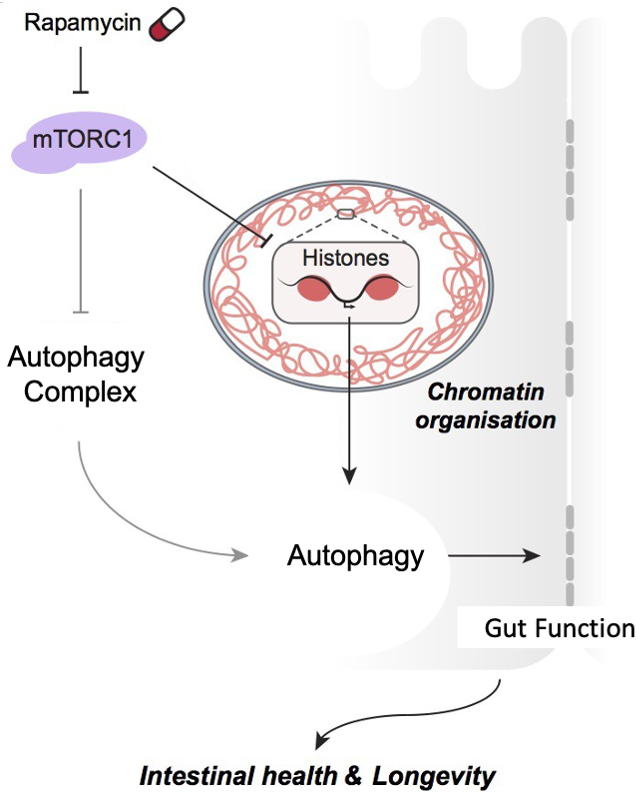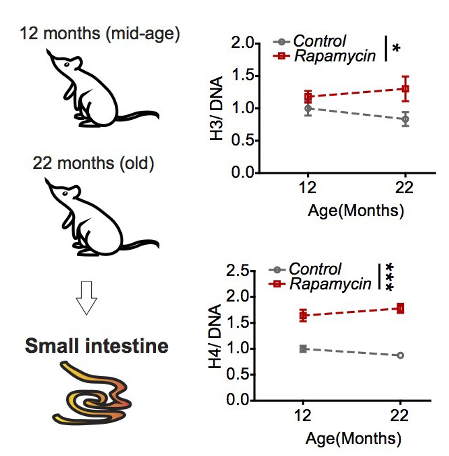Key Points:
- In fruit flies, rapamycin-induced improvements in gut health, and slightly increased lifespan are due to increased histones – proteins that help maintain the compact organization of DNA in the cell nucleus.
- Rapamycin also increases histone levels and reorganizes DNA in the small intestines of mice.
We are made of cells, most of which are tiny and invisible to the naked eye. Within each cell is an even smaller structure, the nucleus. Considering its tininess, some might wonder how all of our genetic material can be crammed into such a small space. What helps are millions upon millions of proteins called histones, which DNA tightly coils around to maintain a close-packed arrangement. Interestingly, a study published in eLife, suggests that if we have more histones, we could live longer.
Lu and colleagues from the Max Planck Institute in Germany and the University College London have uncovered an unexpected link between histone levels and a nutrient-sensing complex known as mTOR. By treating fruit flies and mice with rapamycin – a drug that inhibits mTOR – histone protein levels go up in intestinal cells. This increase in histone levels leads to rearrangements in the organization of DNA and histones, activating genes for autophagy – the cell clearance system. In fruit flies, increased histone levels mediate the rapamycin-induced extension of lifespan and improve gut health. Overall, these findings show that the longevity-associated benefits of rapamycin are mediated by histone levels and rearrangements in DNA organization.

DNA Rearrangment Extends Fly Lifespan
Intestinal cells play a key role in gut (gastrointestinal tract) health and aging. Unregulated intestinal cell growth in the gut is at the root of age-related intestinal disease, which reduces lifespan. Since rapamycin prevents unregulated intestinal cell growth, Lu and colleagues examined whether increased histone levels mediate its effects. By genetically reducing histones from flies, they showed that rapamycin-induced lifespan extension was completely prevented, demonstrating that histones are necessary for rapamycin-induced life extension.

Further experiments showed that rapamycin induced an increase in histone protein levels, rearranging the organization of DNA, allowing for the activation of autophagy-related genes. Autophagy is a process used by cells to get rid of unwanted material and plays an important role in gut health and longevity. Together, these findings suggest that the underlying cause of rapmycin-induced lifepsan extension is DNA rearrangement, leading to increased autophagy and gut health.
To investigate whether their findings were conserved between flies and mammals, Lu and colleagues tested whether rapamycin increased histone levels in the small intestines of mice. They found that rapamycin treatment increased histone levels in 12-month-old (equivalent to about a 58-year-old human) and 22-month-old (about a 70-year-old human) mice, consistent with the results in flies. Rapamycin treatment also induced modest DNA reorganization, suggesting that rapamycin leads to similar molecular changes in flies and mammals.

Uncovering the Secrets of Rapamycin
The findings of Lu and colleagues suggest that rapamycin improves gut health and increases lifespan by increasing histone proteins, which reorganizes DNA to activate autophagy. In general, activating autophagy-related genes can prevent age-related dysfunction, memory impairment, and muscular dystrophy in animal models. In humans, rapamycin affects DNA organization in the cells of normal individuals in a way that mimics the DNA organization of centenarians (invidiuals who live to be 100 years old). Therefore, understanding rapamycin’s regulation of autophagy could lead to the development of treatments for age-related ailments. Rapamycin is currenlty used as a medication under the generic name sirolimus to supress the immune system upon organ transplantation. Under Pfizers brand name, Rapamune, side effects include increased risk of infection and getting cancer, although these side effects may only occur with high dosages.